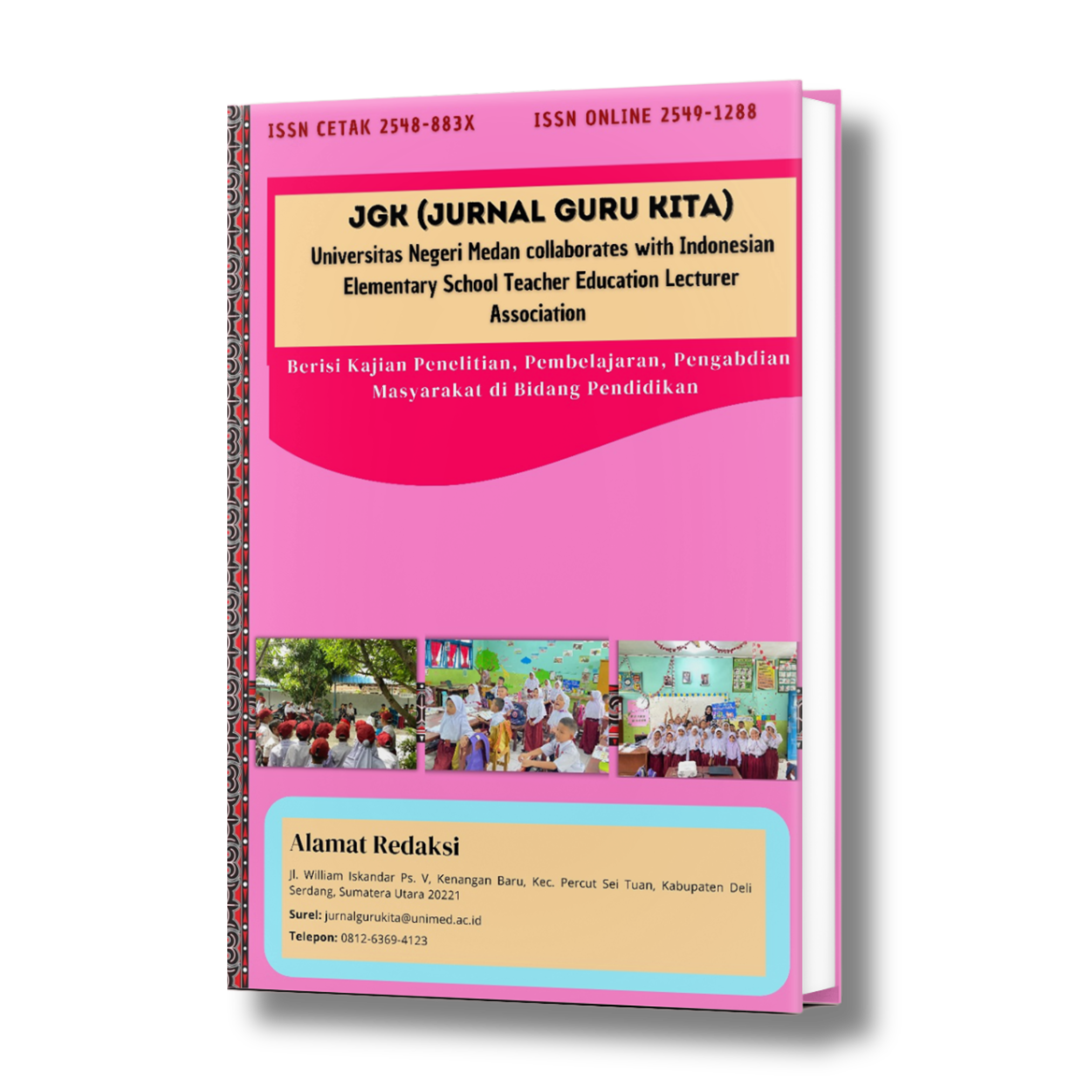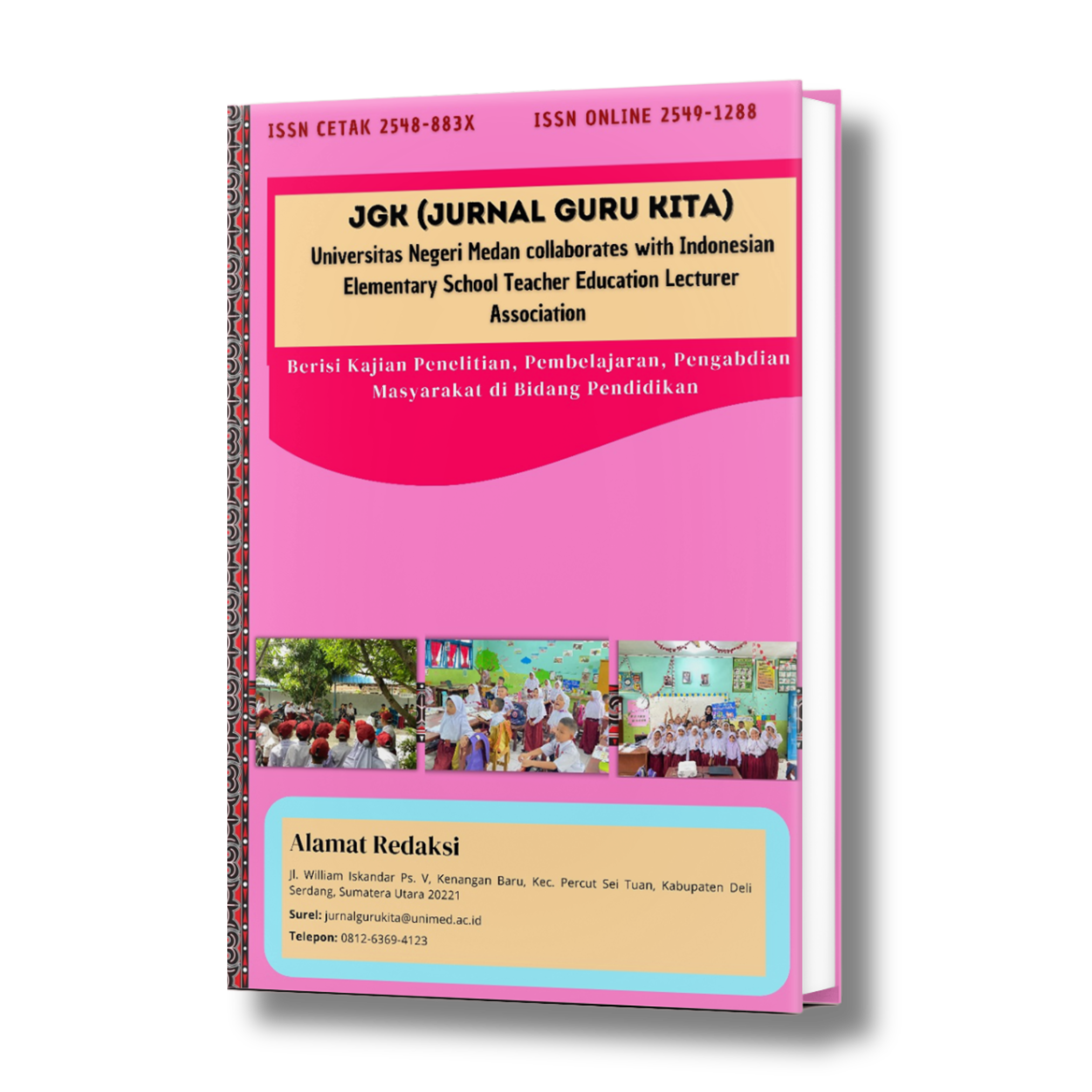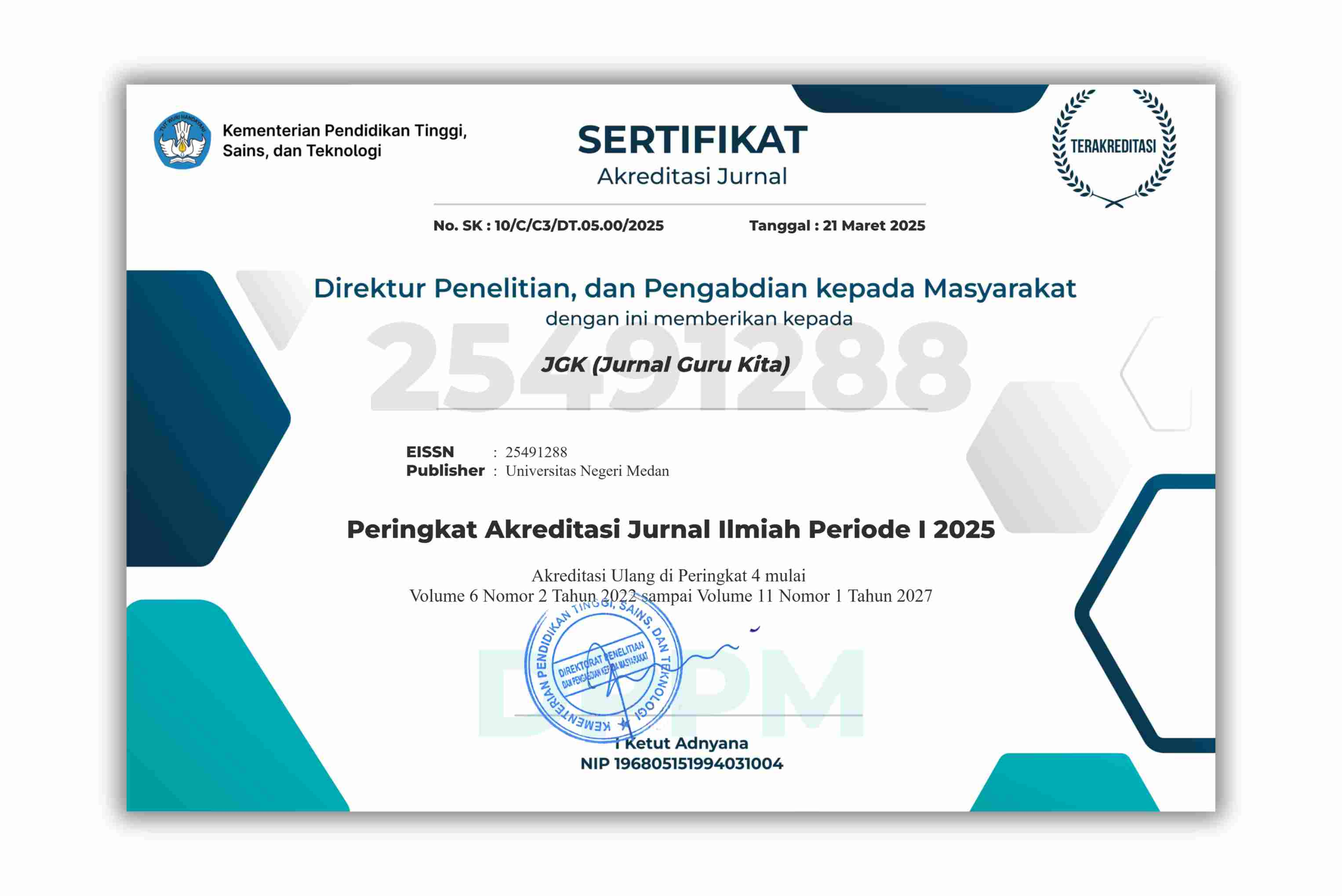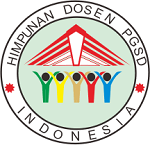Pengembangan Lembar Kerja Peserta Didik (LKPD) Berbasis Problem Solving Materi Konsep Pecahan Meningkatkan Keterampilan Berpikir Kritis
DOI:
https://doi.org/10.24114/jgk.v9i3.69443Keywords:
LKPD, Problem Solving, Konsep Pecahan, Berpikir KritisAbstract
Penelitian pengembangan ini bertujuan untuk: 1) menganalisis kebutuhan pengembangan Lembar Kerja Peserta Didik (LKPD) Berbasis Problem Solving; 2) mengetahui bentuk pengembangan LKPD Berbasis Problem Solving; dan 3) menguji kelayakan, kepraktisan, dan keefektifan LKPD Berbasis Problem Solving. Penelitian pengembangan ini menggunakan metode ADDIE. Analysis, dilakukan untuk menganalisis kebutuhan pengembangan LKPD; Design, membuat rancangan LKPD; Development mengembangkan LKPD yang kemudian dilakukan penilaian oleh tim ahli guna perbaikan; Implementation, mengimplementasikan LKPD sebagai bahan penunjang pembelajaran; dan Evaluation, hasil evaluasi menunjukkan bahwa LKPD Berbasis Problem Solving sangat layak digunakan. Subyek penelitian terdiri dari 5 peserta didik untuk uji coba terbatas dan 50 peserta didik untuk uji coba luas. Analisis data menggunakan analisis deskripsi kuantitatif. Jenis instrumen yang digunakan yaitu wawancara, angket, lembar catatan saran, dan hasil belajar peserta didik. Hasil penelitian menunjukkan pengembangkan LKPD Berbasis Problem Solving masuk dalam kategori sangat layak, sangat praktis dan sangat efektif digunakan. Uji kelayakan dilakukan oleh ahli materi dengan persentase sebesar 89%, ahli media sebesar 70%, ahli bidang pendidikan dan pembelajaran sebesar 92%. Uji kepraktisan pada uji coba terbatas memperoleh persentase sebesar 93,12% dan uji coba luas sebesar 89,42%, serta dalam penerapannya mampu meningkatkan nilai rata-rata kelas dari 57,8 menjadi 81,6. Lembar kerja dinyatakan sangat efektif dengan Uji-T menggunakan Independent Sample Test diperoleh nilai Sig. (2-tailed) .001, sehingga diterima dan ditolak dengan kesimpulan hasil penelitian menunjukkan ada perbedaan yang signifikan antara hasil belajar yang menggunakan LKPD Berbasis Problem Solving dengan yang tidak menggunakan LKPD Berbasis Problem Solving.References
Almulla, M. A. (2023). Constructivism learning theory: A paradigm for students’ critical thinking, creativity, and problem solving to affect academic performance in higher education. Cogent Education, 10(1). https://doi.org/10.1080/2331186X.2023.2172929
Daryanes, F., Darmadi, D., Fikri, K., Sayuti, I., Rusandi, M. A., & Situmorang, D. D. B. (2023). The development of articulate storyline interactive learning media based on case methods to train student’s problem-solving ability. Heliyon, 9(4).
Dilekçi, A., & Karatay, H. (2023). The effects of the 21st century skills curriculum on the development of students’ creative thinking skills. Thinking Skills and Creativity, 47, 101229. https://doi.org/10.1016/j.tsc.2022.101229
Djam’an, N., Mariana, N., & Simanjorang, M. M. (2023). Trends in Mathematics Education Research in Indonesia (pp. 163–175). https://doi.org/10.1007/978-981-99-0643-7_8
Fikriana, M. F., Wiyanto, W., & Haryani, S. (2023). Development of the Diary Book of Science with the STEM Approach of Discovery in Improving Students’ Concept Understanding and Scientific Communication Skills. Jurnal Penelitian Pendidikan IPA, 9(4), 1641–1649. https://doi.org/10.29303/jppipa.v9i4.3032
Ghaisani, N. R. T., & Setyasto, N. (2023). Development of Liveworksheets-Based Electronic Student Worksheets (E-LKPD) to Improve Science Learning Outcomes. Jurnal Penelitian Pendidikan IPA, 9(8), 6147–6156. https://doi.org/10.29303/jppipa.v9i8.4571
Kwangmuang, P., Jarutkamolpong, S., Sangboonraung, W., & Daungtod, S. (2021). The development of learning innovation to enhance higher order thinking skills for students in Thailand junior high schools. Heliyon, 7(6), e07309. https://doi.org/10.1016/j.heliyon.2021.e07309
Loyens, S. M. M., van Meerten, J. E., Schaap, L., & Wijnia, L. (2023). Situating Higher-Order, Critical, and Critical-Analytic Thinking in Problem- and Project-Based Learning Environments: A Systematic Review. Educational Psychology Review, 35(2), 39. https://doi.org/10.1007/s10648-023-09757-x
Mandini, G. W., & Hartono, H. (2018). Analisis kemampuan menyelesaikan soal HOTS model TIMSS dan kepercayaan diri siswa sekolah menengah pertama. Pythagoras: Jurnal Pendidikan Matematika, 13(2), 148–157. https://doi.org/10.21831/pg.v13i2.21234
Ponsiglione, A. M., Amato, F., Cozzolino, S., Russo, G., Romano, M., & Improta, G. (2022). A Hybrid Analytic Hierarchy Process and Likert Scale Approach for the Quality Assessment of Medical Education Programs. Mathematics, 10(9), 1426. https://doi.org/10.3390/math10091426
Rivas, S. F., Saiz, C., & Ossa, C. (2022). Metacognitive Strategies and Development of Critical Thinking in Higher Education. Frontiers in Psychology, 13. https://doi.org/10.3389/fpsyg.2022.913219
Shutaleva, A. (2023). Ecological culture and critical thinking: building of a sustainable future. Sustainability, 15(18), 13492.
Sitepu, S. F. B., Suranata, K., & Yudiana, K. (2024). Scientific Approach-Based Student Worksheets on Light and Its Properties to Enhance Learning Outcomes of Fifth Grade Elementary Students. Jurnal Pedagogi Dan Pembelajaran, 7(3), 550–558. https://doi.org/10.23887/jp2.v7i3.82603
South, L., Saffo, D., Vitek, O., Dunne, C., & Borkin, M. A. (2022). Effective Use of Likert Scales in Visualization Evaluations: A Systematic Review. Computer Graphics Forum, 41(3), 43–55. https://doi.org/10.1111/cgf.14521
Suratnu, R. (2023). THE ADOPTION OF THE ADDIE MODEL IN DESIGNING AN INSTRUCTIONAL MODULE: THE CASE OF MALAY LANGUAGE REMOVE STUDENTS. IJIET (International Journal of Indonesian Education and Teaching), 7(2), 262–270. https://doi.org/10.24071/ijiet.v7i2.3521
Teng, M. F., & Yue, M. (2023). Metacognitive writing strategies, critical thinking skills, and academic writing performance: A structural equation modeling approach. Metacognition and Learning, 18(1), 237–260. https://doi.org/10.1007/s11409-022-09328-5
Thornhill-Miller, B., Camarda, A., Mercier, M., Burkhardt, J.-M., Morisseau, T., Bourgeois-Bougrine, S., Vinchon, F., El Hayek, S., Augereau-Landais, M., Mourey, F., Feybesse, C., Sundquist, D., & Lubart, T. (2023). Creativity, Critical Thinking, Communication, and Collaboration: Assessment, Certification, and Promotion of 21st Century Skills for the Future of Work and Education. Journal of Intelligence, 11(3), 54. https://doi.org/10.3390/jintelligence11030054
Tomita, K. (2022). Visual design as a holistic experience: how students’ emotional responses to the visual design of instructional materials are formed. Educational Technology Research and Development, 70(2), 469–502. https://doi.org/10.1007/s11423-022-10088-x
Xu, E., Wang, W., & Wang, Q. (2023). The effectiveness of collaborative problem solving in promoting students’ critical thinking: A meta-analysis based on empirical literature. Humanities and Social Sciences Communications, 10(1), 16. https://doi.org/10.1057/s41599-023-01508-1
Zuhri, M. M., Adnan, A., & Saparuddin, S. (2023). Analisis Kemampuan Literasi Sains Peserta Didik SMA Kelas X IPA di Kota Makassar dalam Menyelesaikan Soal PISA. Bioscientist : Jurnal Ilmiah Biologi, 11(2), 1892. https://doi.org/10.33394/bioscientist.v11i2.9384
Downloads
Published
How to Cite
Issue
Section
License
Copyright (c) 2025 Putri Paremaswari, Eni Titikusumawati

This work is licensed under a Creative Commons Attribution-ShareAlike 4.0 International License.
Authors published with the JGK (Jurnal Guru Kita) agree to the following terms:
- Authors retain copyright and grant the journal the right of first publication with the work simultaneously licensed under a Creative Commons Attribution License (CC BY-SA 4.0) that allows others to share the work with an acknowledgment of the work's authorship and initial publication in this journal.
- Authors are able to enter into separate, additional contractual arrangements for the non-exclusive distribution of the journal's published version of the work (e.g., post it to an institutional repository or publish it in a book), with an acknowledgment of its initial publication in this journal.
- Authors are permitted and encouraged to post their work online (e.g., in institutional repositories or on their website) prior to and during the submission process, as it can lead to productive exchanges, as well as earlier and greater citation of published work. (See The Effect of Open Access)

























